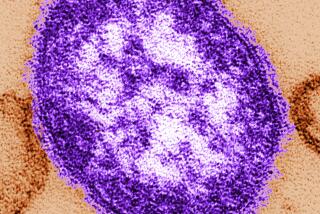Free Measles Vaccination Program Gets Shot in Arm : Health care: Long Beach has received a $29,891 grant to help combat the epidemic. One worker is going door-to-door in Latino neighborhoods to publicize the clinics.
LONG BEACH ā Teresa Gorospe pounded on an apartment door where she heard a baby crying over salsa music and yelled, ā Hola , Mariaā until a woman cracked open the door. Gorospe handed the mother a flyer and urged her to get measles shots for the children.
āThereās an epidemic,ā Gorospe said in Spanish. āPlease do it. Itās free.ā
The mother listened warily, as Gorospe explained how 46% of those who contracted measles last year are Latino preschoolers and how it is life-threatening for the little ones. The mother asked for another bilingual green flyer to give to a neighbor.
āI never heard about this, Iāll go,ā the mother promised.
Gorospe, a former community worker for the Long Beach Unified School District, works part-time for the city Department of Health and Human Services in an outreach program to slow the spread of measles. She is the only staff member assigned to go door-to-door to inform parents about the free immunizations, which cover measles, rubella (German measles) and mumps.
That job takes Gorospe into some of Long Beachās most crime-ridden neighborhoods. A recent trip just before Christmas took her to the Washington Middle School area, past housing complexes where gang shootings have occurred recently.
āIām safe, Iām careful, but itās so important to tell people in these neighborhoods,ā said Gorospe, who dresses brightly in a red shawl and blue-knit beret. Her casual style puts parents at ease, and sometimes their talks end with a hug. āItās hard for people to believe Iām with the health department,ā she added.
Long Beach is experiencing a measles epidemic. In 1989, three children died and 100 cases were reported, compared to 13 cases between 1986 and 1988. The number of measles cases climbed to at least 191 last year. All of the cases were rubeola, the most serious strain. No deaths were recorded locally in 1990.
To handle the emergency, Long Beach received $29,891 for six months of free immunizations as part of a $1.2-million state Health Department grant to six of the hardest-hit California communities. The grant pays for one nurse and one community worker to staff the temporary clinics at schools in predominantly minority communities, where the rate of measles is highest. Childrenās Clinic of Long Beach also provides one nurse and social worker to help with the clinics.
āPeople will come if theyāre told about it in person, and we have an ambitious outreach worker who is really good at getting the word out,ā said Nancy Lewis, the health departmentās nursing services officer.
āIn the past we have advertised and done everything right, and only five or six people show up. Itās the outreach that is different and making people come.ā
The measles clinics so far have attracted 45 to 60 children each day for vaccines, and most of those were invited directly by Gorospe, although other social agencies and teachers refer parents to the program.
Los Angeles County had at least 17 measles-related deaths in 1990, said Charles Alexander, director of immunizations for the Los Angeles County Health Department, which works closely with the Long Beach staff.
Most deaths from measles in the county have occurred in poor Latino neighborhoods where the highly contagious disease spreads quickly via colds and coughs because families live in close quarters. Language barriers prevent some families from learning about free health services.
āWhen parents have to worry about how to pay rent and provide food, having their children immunized is not top on their list of priorities,ā Alexander said. āThatās why it is so important to have the community outreach that is being done in the county and in Long Beach.ā
Long Beach Health and Human Services Director Diana Bonta said the talks by Gorospe and the public health nurses have been extremely successful in educating parents about vaccines.
In 1989, the three children who died in Long Beach were from Samoan families, and some parents said they were opposed to immunizations because it was against their belief to inject foreign substances into their children. Such cultural opposition is rare, and programs aimed at Samoans in 1990 have been somewhat successful by emphasizing safety for the children, Bonta said.
āAll of us value our children, and we must emphasize that immunization is important for their future, no matter what cultural background they are from,ā Bonta said.
People in immigrant communities often are unaware of the low-cost health services available, and measles is preventable, Gorospe said. Many parents in those communities are unaware that vaccines are required for children before they go into school.
Causing fever and flu symptoms, measles is characterized by a red, blotchy rash. The general malaise lasts 10 days and could include pneumonia and encephalitis.
Measles shots are recommended for children 15 months and older. Some families are undocumented, and are afraid of going to the clinics and perhaps being deported, but Gorospe tries to allay their fears and correct some misinformation.
āSome parents think their children will get sick if they get immunized, and sometimes flu-like symptoms do develop a day or so after. So, I just tell them to give the child a few Tylenols and be thankful they are vaccinated against an even worse illness,ā Gorospe said.
Just before Christmas, Gorospe canvassed the neighborhood surrounding Roosevelt Elementary School in the 90813 ZIP code, which has been the area hardest hit by measles.
She talked to a Cambodian man squatting down on the school lawn as his wife gently herded two toddlers with a stick. She told a Vietnamese man with a white beard hanging down to his waist about the importance of getting shots for his two grandchildren. And, she walked through an alley marked by gang graffiti to a garage apartment where she listened to the concerns of a black mother caring for four children.
āNone of these parents want their children sick, they just arenāt aware,ā Gorospe said.
Standing outside the elementary school, Flor Ramirez cradled her 8-month-old baby, Jasmine, and asked Gorospe about the shots. Maria Suarez, who has four children, also listened as her son Daniel, 3, grew teary eyed.
āWill I have to get a shot?ā he asked.
Gorospe bent down to the boyās level, wiped away a tear on his cheek and said, āItās important so that you donāt get sick. We donāt want that to happen to you. Do you want to get sick?ā
The boy shook his head and went off to play with friends.
Waiting in front of Roosevelt School for her kindergartner Atavia, Harriett Jackson said many neighborhood children have suffered a recent outbreak of prolonged illnesses and many mothers are worried.
āIām surprised to hear thereās an epidemic,ā said Jackson, who has four children. āI thank God for these free clinics, but thereās so much sickness going around I hardly want my children going out and playing with other kids. Iām making sure they have all their shots.ā
Easy prevention with vaccines adds to the frustration of Long Beach health officials in their effort to control measles, said Long Beach public health nurse Libby Grasse, who accompanied Gorospe in the community recently.
āEvery year we expect the number to go down, but every year it comes up even stronger,ā Grasse said.
That is why Gorospe, who is paid part-time, is informing parents full-time, all the time. āEven when Iām shopping and I see a group of mothers with small children I hand them notices about clinics,ā Gorospe said. āItās so important.ā
FREE CLINICS
The schedule for the clinics is: Jan. 9 at International School, 450 Long Beach Blvd.; Jan. 16 at Burnett School, 565 E. Hill St.; Jan. 23 at Roosevelt School, 1574 Linden Ave.; Jan. 30 at King School, 145 E. Artesia Blvd.; Feb. 6 at Whittier School, 1761 Walnut Ave.; Feb. 13 at Grant School, 1225 E. 64th St.; Feb. 20 at Edison School, 625 Maine Ave.; Feb. 27 at Willard School, 1055 Freeman Ave.; March 6 at Washington School, 1450 Cedar Ave.; and March 13 at Edison School, 625 Maine Ave. and every Monday evening in the main office at 2655 Pine Ave. The free measles clinics are open from 3 to 6 p.m., and all children must be accompanied by a parent or guardian with immunization records, if possible.
More to Read
Sign up for Essential California
The most important California stories and recommendations in your inbox every morning.
You may occasionally receive promotional content from the Los Angeles Times.










